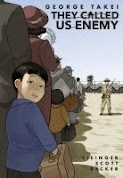Ok, the term ‘funny books’ certainly shows my age (which will be hinted at but never revealed). The comics of my day have grown from mere colorful depictions of Archie led high jinks and the exciting adventures of the brave, but tragically fashioned challenged, men and women of Marvel and DC to literary showcases of deep, meaningful topics. While the NHTI Library has many books covering events that are covered under the topic of social justice another layer of understanding is added when the book combines both pictures and words as is the case of graphic novels. The graphic novels listed below are a sample of the gems you will find in the collection.
I Am Alfonso Jones by Tony Medina
Alfonso can't wait to play the role of Hamlet in his school's
hip-hop rendition of the classic play. But as he is buying his first suit, an
off-duty police officer mistakes a clothes hanger for a gun and shoots Alfonso.
When Alfonso wakes up in the afterlife, he's on a ghost train guided by
well-known victims of police shootings, who teach him what he needs to know
about this subterranean spiritual world. Meanwhile, Alfonso's family and
friends struggle with their grief and seek justice for Alfonso in the streets.
Incognegro: A Graphic Mystery Novel by Mat Johnson
In the early 20th Century, when lynchings were commonplace
throughout the American South, a few courageous reporters from the North risked
their lives to expose these atrocities. They were African-American men who, due
to their light skin color, could "pass" among the white folks. They
called this dangerous assignment going "incognegro.".
Maus: A Survivor’s Tale by Art Speigelman
A brutally moving work of art--widely hailed as the greatest
graphic novel ever written--Maus recounts
the chilling experiences of the author's father during the Holocaust, with Jews
drawn as wide-eyed mice and Nazis as menacing cats.
They Called Us Enemy by George Takei
Long before he braved new frontiers in Star Trek, he woke up as a four-year-old boy to find
his own birth country at war with his father's -- and their entire family
forced from their home into an uncertain future. In 1942, at the order of President Franklin
D. Roosevelt, every person of Japanese descent on the west coast was rounded up
and shipped to one of ten "relocation centers," hundreds or thousands
of miles from home, where they would be held for years under armed guard.
They Called Us Enemy is Takei's firsthand account of those years
behind barbed wire, the joys and terrors of growing up under legalized racism,
his mother's hard choices, his father's faith in democracy, and the way those
experiences planted the seeds for his astonishing future.
Climate Changed: A Personal Journey Through the Science by Philipp Squarzoni








No comments:
Post a Comment